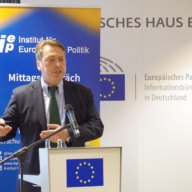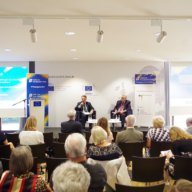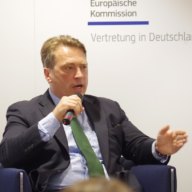Public Debate with Ambassador Thomas Ossowski, Special Representative for the Negotiations on the MFF

On 6 June 2018, Ambassador Thomas Ossowski, Special Representative for the Negotiations on the Multiannual Financial Framework and Director for EU Policies at the German Federal Foreign Office, spoke at a Public Debate at the Representation of the European Commission in Berlin on the “Perspectives on the negotiations on the Multiannual Financial Framework”. Richard Kühnel, Head of the European Commission in Germany gave the greeting. The event was moderated by Prof. Dr. Mathias Jopp, Director of the Institute for European Politics (IEP).
Mr. Kühnel made the importance of the topic of this Public Debate clear right at the beginning. Imagine an EU where hundreds of thousands of students would not receive an Erasmus grant, because Member States could not agree on the budgetary framework. Mathias Jopp took up the thread and accentuated the tight timeframe for the Multiannual Financial Framework (MFF) to be ready by the European Parliament Election 2019. In addition, “strong centrifugal forces within the EU” could make the negotiations even more difficult. He referred to the Brexit, Euro-critical governments in the EU and the spread of populism. In his forthcoming presentation, Ambassador Ossowski commented on the Commission proposal, explaining the German priorities and referring to the already detailed sectoral regulations. In general, he described the Commission proposal as ambitious, but also as a “good starting point” for further negotiations. Instead of asking for 1% of the gross national income of the states as a contribution to the EU, the Commission wants to increase the share to 1.11%. This not only has to do with the loss of Great Britain as a strong net contributor. Rather, the Union faces decisive macropolitical alignments, for example in migration and security policy that demand modern and flexible solutions. It is also about simplifying European investment programmes, a better linking of structural reforms to structural funds, or changing the Berlin formula used to calculate national turnovers in cohesion policy: Ossowski underlined the fact that with the loss of Great Britain, all countries would have to pay a higher fee in the future. The EU Commission also proposed a rule of law mechanism that would allow the Commission to check whether EU spending could be achieved in a constitutionally sound and healthy environment. Germany would welcome the underlying idea that the EU should continue to understand itself more as a community of values. In general, he made clear that the German government was open to many of the Commission’s innovations. As always, time pressure was a crucial element in the negotiations. However, it would be desirable to conclude the negotiations before the European Parliament elections in 2019.
The subsequent, lively discussion participants often asked for the feasibility of the Commission proposals. The withdrawal of Great Britain, for example, was taken up as an issue as it was asked if the missing contributions were really so easy to handle. “We have no other choice,” countered Ossowski, stressing the challenges of the international situation in the 21st century and the need to understand the reorientation of the MFF as a response to these developments. The feasibility of linking EU funding to rule-of-law conditions in the Member States was a controversial topic as well during the discussion.
In total, the Public Debate stood only at the beginning of the negotiations of the MFF, so that the topic will stay on top of the European political agenda for some time to come.
Author: Florian Lange













